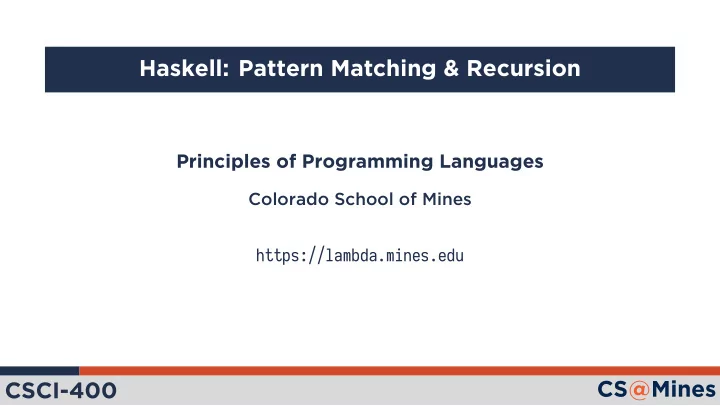

Haskell: Pattern Matching & Recursion Principles of Programming Languages Colorado School of Mines https://lambda.mines.edu CSCI-400
Share your work with your learning group members. Discuss: 1 Where did you make use of type variables and typeclasses? 2 Were your declarations ever too restrictive for the problem? Or too broad? I will go around and check ofg your LGA. Have any questions for me? Homework questions? Also feel free to ask your group on HW questions. Learning Group Activity CSCI-400
In Haskell, when you write multiple function bodies, the body that matches fjrst gets called. For example: Pattern Matching hungryNumber :: ( Integral a) => a -> String hungryNumber 7 = "Eats nine" hungryNumber 9 = "Gets eaten by seven" hungryNumber n = "Does not eat other numbers" CSCI-400
One excellent use for pattern matching: recursion. Recursion using Pattern Matching factorial :: ( Integral a) => a -> a factorial 0 = 1 factorial n = n * factorial (n - 1) CSCI-400
A tuple with variables in a pattern match will assign names to each element. Pattern Matching Tuples addVectors :: ( Num a) => (a, a) -> (a, a) -> (a, a) addVectors (x1, y1) (x2, y2) = (x1 + x2, y1 + y2) CSCI-400
To match the empty list, use an empty list as the pattern: Pattern Matching Lists hasStuff :: [a] -> Bool hasStuff [] = False hasStuff xs = True CSCI-400
head' :: [a] -> a head' [] = error "Can't do a head on nothing!" head' (x : xs) = x Example: Match a list with one or more element Deconstruction Pattern Use (x:xs) as a pattern to: Get the head of the list as x Get the tail of the list as xs The names x and xs are arbitrary, but common. CSCI-400
Example: Match a list with one or more element Deconstruction Pattern Use (x:xs) as a pattern to: Get the head of the list as x Get the tail of the list as xs The names x and xs are arbitrary, but common. head' :: [a] -> a head' [] = error "Can't do a head on nothing!" head' (x : xs) = x CSCI-400
Deconstruction & Recursion: Map Example map' :: (a -> b) -> [a] -> [b] map' _ [] = [] map' f (x : xs) = f x : map' f xs CSCI-400
Similarly, you can use an (x:xs) pattern: -- uses an input like [[1, 3], [4]] tails :: [[a]] -> [[a]] tails xs = [ys | (y : ys) <- xs] tails = map tail Patterns can be placed into the RHS of a list comprehension: Of course, this could have been written much more expressive as Patterns in List Comprehensions -- uses an input like [(1, 2), (3, 4)] addPairs :: ( Num a) => [(a, a)] => [a] addPairs xs = [a + b | (a, b) <- xs] CSCI-400
tails = map tail Patterns can be placed into the RHS of a list comprehension: Of course, this could have been written much more expressive as Patterns in List Comprehensions -- uses an input like [(1, 2), (3, 4)] addPairs :: ( Num a) => [(a, a)] => [a] addPairs xs = [a + b | (a, b) <- xs] Similarly, you can use an (x:xs) pattern: -- uses an input like [[1, 3], [4]] tails :: [[a]] -> [[a]] tails xs = [ys | (y : ys) <- xs] CSCI-400
Patterns can be placed into the RHS of a list comprehension: Of course, this could have been written much more expressive as Patterns in List Comprehensions -- uses an input like [(1, 2), (3, 4)] addPairs :: ( Num a) => [(a, a)] => [a] addPairs xs = [a + b | (a, b) <- xs] Similarly, you can use an (x:xs) pattern: -- uses an input like [[1, 3], [4]] tails :: [[a]] -> [[a]] tails xs = [ys | (y : ys) <- xs] tails = map tail CSCI-400
When the whole value of a pattern is desired, as well as the decomposed names, As-Patterns the @ symbol can be used to create an alias. firstLetter :: String -> String firstLetter word@(x :_ ) = "The first letter of " ++ word ++ " is " + [x] CSCI-400
Recommend
More recommend